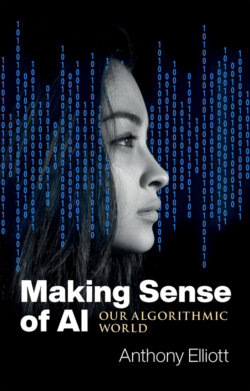Читать книгу Making Sense of AI - Anthony Elliott - Страница 11
2 Making Sense of AI
ОглавлениеThe rise of AI has stirred massive global controversy. Not just in universities and think tanks, but across industries and business circles. For many, the very idea of AI generates alarm. The advance of AI represents a major threat to jobs, employment, enterprise and industrial manufacture, and stokes up anxieties that pervade many other areas of life too. The more powerful automated systems become, the more many people worry about the risk that artificial general intelligence might result someday in human annihilation or some other irreversible global nightmare. In this scenario, the rise of AI is potentially catastrophic. AI is equated here with an apocalyptic social future. Another response, albeit very different in perspective, views these technological breakthroughs more positively. This response concentrates on new possibilities, hopes – and dreams for a better world. On the face of things, AI is a breakthrough science, and thereby promises great opportunities for the reshaping of economies, societies and political choices today. In this scenario, the coming AI revolution foreshadows the opening of a new era, one which will radically transform people’s daily habits and the world in which they live. AI is a new driver of production and will generate new sources of economic growth, changing how work is done and dramatically increasing growth in businesses worldwide.
The differences between these standpoints, and the stakes involved for economy and society, are great indeed. What emerges very clearly from this controversy, however, is that there is no orthodox consensus on the consequences of AI. On the contrary, divergent interpretations and theories compete for public attention. Newspapers, magazines, radio and TV programmes covering the latest developments in AI highlight an immense diversity of opinions and arguments, in which a mêlée of voices seeks to make sense of the great controversy about the rise of intelligent machines. Nor has AI been properly understood, or effectively responded to, by existing policy frameworks or political traditions. One reason for this is that the political traditions of conservatism, liberalism and socialism are tied, in cross-cutting though distinct ways, to social, economic and political forms of thought associated with industrial modernity. This is perhaps why the impacts of AI have often been understood narrowly – for example, in solely economic terms. Yet the very technologies associated with AI disrupt established economic orthodoxies and political paradigms, creating novel social consequences and powerful global transformations.
The consequences of AI – what it is doing to our economies and societies, and its future possibilities – have to be systematically understood. Contrasting hypotheses, interpretations and theories of AI and its consequences cluster around two main lines of argumentation. The first of these I shall refer to as the position advanced by sceptics. The sceptics are today in a minority, and yet have significantly influenced public opinion and much policy thinking on AI and its ramifications. Simply put, sceptics say that claims of an AI revolution are overblown. For many of a sceptical persuasion, the spectre of AI is too often invoked to explain away complex institutional changes occurring throughout the world today. These are changes to do with the international economy, workplace change and geopolitics. The contrasting, second position is occupied by those I call transformationalists. The AI revolution, argue transformationalists, is creating a world of radical change. This is the dawn of a new era, one in which the intersecting forces of economy, society and politics shift in fundamentally new directions. From this perspective, AI powerfully disrupts traditional ways of doing things, ushering in new economic conditions, social divisions and political alignments.
